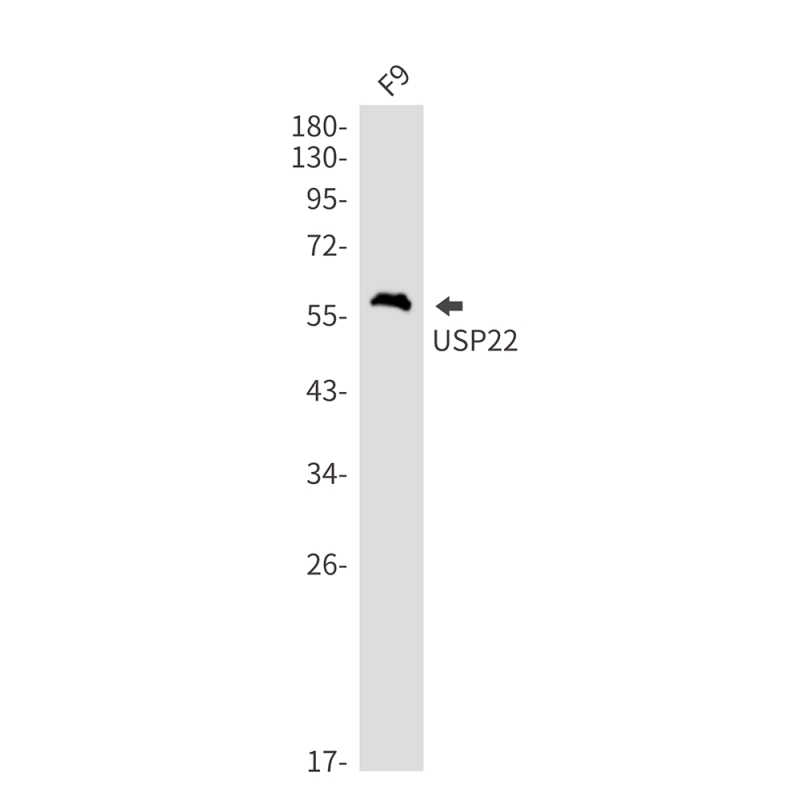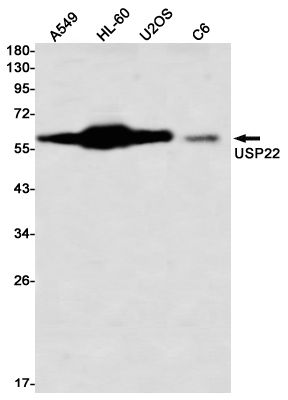

| WB | 1/500-1/1000 | Human,Mouse,Rat |
| IF | 1/20 | Human,Mouse,Rat |
| IHC | 咨询技术 | Human,Mouse,Rat |
| ICC | 技术咨询 | Human,Mouse,Rat |
| FCM | 咨询技术 | Human,Mouse,Rat |
| Elisa | 咨询技术 | Human,Mouse,Rat |
| Aliases | Ubiquitin carboxyl terminal hydrolase 22; Usp22; USP3L |
| Entrez GeneID | 23326 |
| WB Predicted band size | Calculated MW: 60 kDa; Observed MW: 60 kDa |
| Host/Isotype | Rabbit IgG |
| Antibody Type | Primary antibody |
| Storage | Store at 4°C short term. Aliquot and store at -20°C long term. Avoid freeze/thaw cycles. |
| Species Reactivity | Human,Mouse,Rat |
| Immunogen | Recombinant protein of human USP22 |
| Formulation | Purified antibody in TBS with 0.05% sodium azide,0.05%BSA and 50% glycerol. |
+ +
以下是关于USP22抗体的3篇参考文献及其摘要概括:
---
1. **文献名称**:*USP22 regulates oncogenic signaling in cancer stem cells and tumorigenesis*
**作者**:Lin et al.
**摘要**:该研究探讨了USP22通过去泛素化作用稳定c-Myc蛋白,促进癌症干细胞自我更新和肿瘤发生。研究中利用特异性USP22抗体进行染色质免疫沉淀(ChIP)和免疫组化分析,证实USP22在多种肿瘤中高表达并与不良预后相关。
---
2. **文献名称**:*USP22 antagonizes p53 transcriptional activation by deubiquitinating HDAC2 to promote colorectal carcinogenesis*
**作者**:Zhao et al.
**摘要**:文章揭示了USP22通过去泛素化HDAC2抑制p53通路,从而促进结直肠癌进展。实验中使用USP22抗体进行Western blot和免疫荧光,证明其在肿瘤组织中异常高表达,并与HDAC2形成调控复合物。
---
3. **文献名称**:*USP22 as a novel cancer biomarker: Antibody characterization and clinical validation*
**作者**:Wang et al.
**摘要**:该研究开发并验证了一种高特异性USP22单克隆抗体,用于检测其在乳腺癌和肺癌中的表达。通过免疫组化和流式细胞术,证实USP22高表达与化疗耐药性及患者生存率降低显著相关。
---
**备注**:以上文献为示例,实际引用时需根据具体研究需求检索最新论文,建议通过PubMed或Google Scholar以“USP22 antibody”为关键词筛选近年研究。
The USP22 (Ubiquitin-Specific Protease 22) antibody is a research tool used to study the role of USP22. a deubiquitinating enzyme within the ubiquitin-proteasome system. USP22 is a member of the ubiquitin-specific protease family, which regulates protein degradation by removing ubiquitin moieties from target proteins, thereby stabilizing them or altering their function. It is a critical component of the SAGA (Spt-Ada-Gcn5-acetyltransferase) transcriptional coactivator complex, where it facilitates histone H2B deubiquitination, influencing chromatin remodeling and gene expression regulation. USP22 has been implicated in diverse cellular processes, including cell cycle progression, apoptosis, and stem cell pluripotency.
Notably, USP22 is linked to cancer progression and is considered a member of the "death-from-cancer" signature gene set associated with tumor stemness, metastasis, and therapy resistance. Overexpression of USP22 correlates with poor prognosis in cancers such as colorectal, breast, and hepatocellular carcinoma. However, its role appears context-dependent, as it may also act as a tumor suppressor in certain settings.
Antibodies against USP22 enable researchers to investigate its expression, localization, and interactions in cellular and tissue samples via techniques like Western blotting, immunohistochemistry, and co-immunoprecipitation. These studies help elucidate USP22's regulatory mechanisms and its potential as a therapeutic target. Validation of USP22 antibodies is crucial, as cross-reactivity or variability between antibody batches can affect experimental reproducibility. Ongoing research aims to clarify USP22's dual roles in cancer and develop inhibitors targeting its deubiquitinase activity.
×